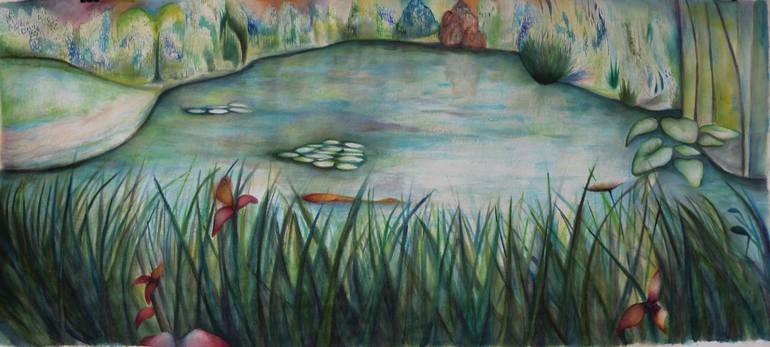






346 Views
4
View In My Room
Painting, Watercolor on Paper
Size: 78.7 W x 39.4 H x 0.4 D in
Ships in a Tube
$2,925
Shipping included
14-day satisfaction guarantee
Trustpilot Score
346 Views
4
ABOUT THE ARTWORK
DETAILS AND DIMENSIONS
SHIPPING AND RETURNS
Initial inspiration for the cycle Artificial Nature came out from the spectacular views of the wisteria flowers at Kawachi Fuji Gardens, in Kitakyushu, Japan. Representing an example of Japanese perception of beauty and architecture, in these gardens many visitors witnessed the experience of an over...
Year Created:
2015
Subject:
Mediums:
Mediums:
Painting, Watercolor on Paper
Rarity:
One-of-a-kind Artwork
Size:
78.7 W x 39.4 H x 0.4 D in
Ready to Hang:
Not Applicable
Frame:
Not Framed
Authenticity:
Certificate is Included
Packaging:
Ships Rolled in a Tube
Delivery Cost:
Shipping is included in price.
Delivery Time:
Typically 5-7 business days for domestic shipments, 10-14 business days for international shipments.
Returns:
14-day return policy. Visit our help section for more information.
Handling:
Ships rolled in a tube. Artists are responsible for packaging and adhering to Saatchi Art’s packaging guidelines.
Ships From:
Serbia.
Customs:
Shipments from Serbia may experience delays due to country's regulations for exporting valuable artworks.
Need more information?
Need more information?
Marija Maša Jovanović (1983) graduated and specialized at the Departemenet for painting at the Faculty of Fine Arts, Belgrade (2007; 2011). She obtained M.A. degree at the IUAV University (Venice, Italy, Dpt. Progettazione e produzione delle arti visive: 2011). Awarded with full scholarships she attended Idyllwild Arts Academy (USA, California, 1999–2002), M.A. studies (Venice, Italy 2008–2011) and International Summer Academy of Fine Arts (scholarship of Kultur Kontakt, Salzburg, Austria, 2010). In 2007. she was awarded by “Rista and Beta Vukanović, painters” prize for painting. In 2012, she exhibited in Selection of 12 most promising artist of the IUAV University curator Cornelia Lauf, Bevilacqua la masa, Venice, Italy. As resident artist, she worked in the atelier of prestigious International City of Arts (Paris, Cité Internationale des Arts, 2011)..In parallel with eight solo exhibitions, she exhibited in numerous juried group exhibitions in Serbia and abroad (USA, Italy, Japan, Austria, Finland). Member of the Associations of Visual Artists of Serbia from 2007, and member of the Association of Applied Arts Artists and Designers from 2012, she acts as free-lanced artist.
Why Saatchi Art?
Thousands of
5-Star Reviews
We deliver world-class customer service to all of our art buyers.
Global Selection of Original Art
Explore an unparalleled artwork selection from around the world.
Satisfaction Guaranteed
Our 14-day satisfaction guarantee allows you to buy with confidence.
Support Emerging Artists
We pay our artists more on every sale than other galleries.
